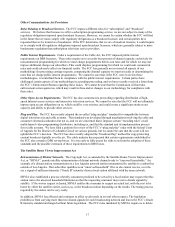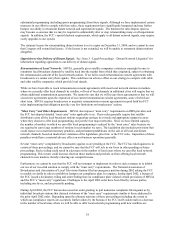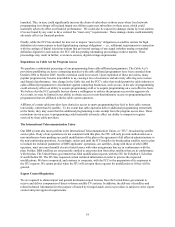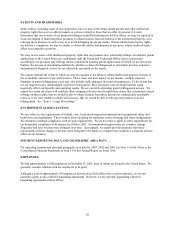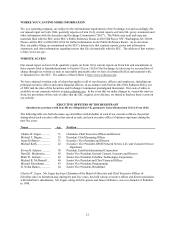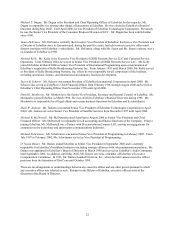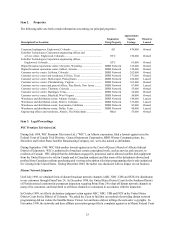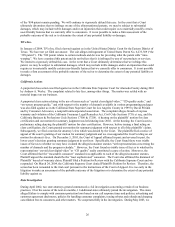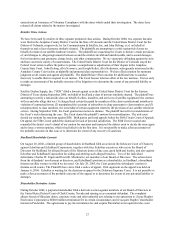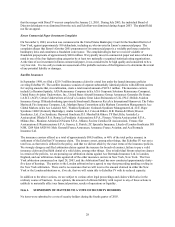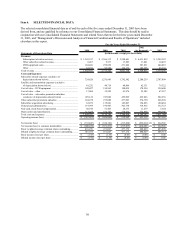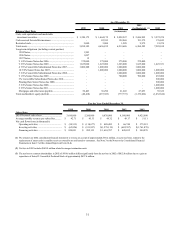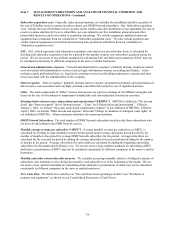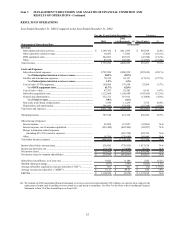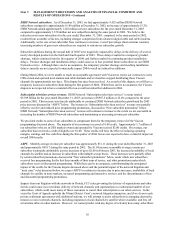Dish Network 2003 Annual Report Download - page 31
Download and view the complete annual report
Please find page 31 of the 2003 Dish Network annual report below. You can navigate through the pages in the report by either clicking on the pages listed below, or by using the keyword search tool below to find specific information within the annual report.26
of the ‘094 patent remain pending. We will continue to vigorously defend this case. In the event that a Court
ultimately determines that we infringe on any of the aforementioned patents, we may be subject to substantial
damages, which may include treble damages and/or an injunction that could require us to materially modify certain
user-friendly features that we currently offer to consumers. It is not possible to make a firm assessment of the
probable outcome of the suit or to determine the extent of any potential liability or damages.
TiVo Inc.
In January of 2004, TiVo Inc. filed a lawsuit against us in the United States District Court for the Eastern District of
Texas. We have not yet filed our answer. The suit alleges infringement of United States Patent No. 6,233,389 (“the
‘389 patent”). The ‘389 patent relates to certain methods and devices for providing what the patent calls “time-
warping”. We have examined this patent and do not believe that it is infringed by any of our products or services.
We intend to vigorously defend this case. In the event that a Court ultimately determines that we infringe this
patent, we may be subject to substantial damages, which may include treble damages and/or an injunction that could
require us to materially modify certain user-friendly features that we currently offer to consumers. It is not possible
to make a firm assessment of the probable outcome of the suit or to determine the extent of any potential liability or
damages.
California Actions
A purported class action was filed against us in the California State Superior Court for Alameda County during 2001
by Andrew A. Werby. The complaint related to late fees, among other things. The matter was settled with no
material impact on our business.
A purported class action relating to the use of terms such as “crystal clear digital video,” “CD-quality audio,” and
“on-screen program guide,” and with respect to the number of channels available in various programming packages
was also filed against us in the California State Superior Court for Los Angeles County in 1999 by David Pritikin
and by Consumer Advocates, a nonprofit unincorporated association. The complaint alleges breach of express
warranty and violation of the California Consumer Legal Remedies Act, Civil Code Sections 1750, et seq., and the
California Business & Professions Code Sections 17500 & 17200. A hearing on the plaintiffs’ motion for class
certification and our motion for summary judgment was held during June 2002. At the hearing, the Court issued a
preliminary ruling denying the plaintiffs' motion for class certification. However, before issuing a final ruling on
class certification, the Court granted our motion for summary judgment with respect to all of the plaintiffs’ claims.
Subsequently, we filed a motion for attorney’s fees which was denied by the Court. The plaintiffs filed a notice of
appeal of the court's granting of our motion for summary judgment and we cross-appealed the Court's ruling on our
motion for attorney's fees. On December 5, 2003, the Court of Appeal affirmed in part; and reversed in part, the
lower court’s decision granting summary judgment in our favor. Specifically, the Court found there were triable
issues of fact as to whether we may have violated the alleged consumer statutes “with representations concerning the
number of channels and the program schedule.” However, the Court found no triable issue of fact as to whether the
representations “crystal clear digital video” or “CD quality” audio constituted a cause of action. Moreover, the
Court affirmed that the “reasonable consumer” standard was applicable to each of the alleged consumer statutes.
Plaintiff argued the standard should be the “least sophisticated” consumer. The Court also affirmed the dismissal of
Plaintiffs’ breach of warranty claim. Plaintiff filed a Petition for Review with the California Supreme Court and we
responded. On March 24, 2004, the California Supreme Court denied Plaintiff's Petition for Review. Therefore, the
action has been remanded to the trial court pursuant to the instructions of the Court of Appeal. It is too early in the
litigation to make an assessment of the probable outcome of the litigation or to determine the extent of any potential
liability against us.
State Investigation
During April 2002, two state attorneys general commenced a civil investigation concerning certain of our business
practices. Over the course of the next six months, 11 additional states ultimately joined the investigation. The states
alleged failure to comply with consumer protection laws based on our call response times and policies, advertising and
customer agreement disclosures, policies for handling consumer complaints, issuing rebates and refunds and charging
cancellation fees to consumers, and other matters. We cooperated fully in the investigation. During May 2003, we



